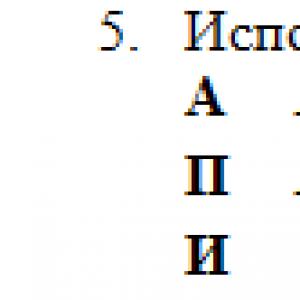Swear words starting with a. Russian swearing: history and meaning of obscene words
Psychologists believe that foul language is an excellent way to relieve stress and restore energy. Some historians consider Russian swearing to be a consequence of the destruction of taboos. In the meantime, while experts are engaged in professional disputes, the people “don’t swear, they speak it.” Today we are talking about the origin of Russian swearing.
There is an opinion that in pre-Tatar Rus' they did not know “strong words”, and when swearing, they compared each other to various domestic animals. However, linguists and philologists do not agree with this statement. Archaeologists claim that the Russian mat was first mentioned in a birch bark document from the beginning of the 12th century. It is true that archaeologists will not make public what exactly was written in that document. Let's try to understand the intricacies of profanity, which is an integral part of the Russian language.
As a rule, when speaking about mat and its origin, linguists and philologists distinguish three main derivative words. These derivatives include the name of the male genital organ, the name of the female genital organ, and the name of what happens under a successful combination of circumstances between the male and female genital organs. Some linguists, in addition to the anatomical and physiological derivatives, add a social derivative, namely, a word that is used to call a woman of easy virtue. Of course, there are other obscene roots, but these four are popularly the most productive and effective.

Delight, surprise, agreement and more
Perhaps the most frequently used word among profanity, the word that is most often written on fences throughout Russia, denotes the male genital organ. Linguists have never agreed on where this word came from. Some experts attribute Old Church Slavonic roots to the word, arguing that in ancient times it meant “to hide” and sounded like “to hove.” And the word “forge” in imperative mood sounded like "kui". Another theory attributes the word to Proto-Indo-European roots. In which the root "hu" meant "shoot".Today it is extremely difficult to talk about the credibility of each of the theories. What can be stated unequivocally is that this word is very ancient, no matter how people with diosyncratic obscene vocabulary would like it. It is also worth noting that “this very word” of three letters is the most productive root that forms new words in the Russian language. This word can express doubt, surprise, indignation, delight, refusal, threat, agreement, despondency, encouragement, etc., etc. The Wikipedia article of the same name alone lists more than seven dozen idioms and words that are derived from this root.
Theft, fighting and death
The word denoting female genital organs in Russian obscene vocabulary is less productive than the word - representative of the stronger sex. Nevertheless, this word has given the Russian language quite a lot of expressions that perfectly reflect the severity of Russian reality. Thus, words with the same root from this well-known word often mean: lie, mislead, beat, steal, talk incessantly. Set expressions, as a rule, indicate a course of events that does not unfold according to plan, educational process, fight, beating, failure and even breakdown or death.Some particularly ardent linguists attribute the origin of this word to Sanskrit. However, this theory does not stand up to even the most humane criticism. Researchers consider the most convincing theory to be the origin of Proto-Indo-European languages. There, according to scientists, the words with the same root as the second most popular word in Russian language meant “saddle”, “what they sit on”, “garden” and “nest”. It is also worth noting that this word can have both a strictly negative and positive connotation.
About sexual intercourse and not only about it
The word that today in obscene vocabulary denotes sexual intercourse comes from the Proto-Indo-European language (jebh-/oibh- or *ojebh) and in its pure form means “to perform a sexual act.” In the Russian language, this word has given rise to a huge number of very popular idioms. One of the most popular is the phrase “fuck your mother.” Linguists claim that the ancient Slavs used this expression in the context of “Yes, I am fit to be your father!” Other expressions with this verb are also known today, meaning to mislead, express indifference, or make claims.Devaluation of the mat
To be fair, it is worth noting that many Russian writers were distinguished by their ability to insert a “strong word” into their speech. There was swearing even in some poems. Of course, we are not talking about fairy tales or love lyrics, but about friendly epigrams and satirical works. And it is worth noting that the great Pushkin masters swear words organically and skillfully:Be quiet, godfather; and you, like me, are sinners,
And you will offend everyone with words;
You see a straw in someone else's pussy,
And you don’t even see a log!
(“From the All-Night Vigil...”)
The trouble with the modern Russian language is that today, due to various circumstances, there is a devaluation of obscenities. It is used so widely that the expression of expressions and the very essence of swearing are lost. As a result, this impoverishes the Russian language and, oddly enough, the culture of speech. For today's situation, the words spoken by another famous poet– Vladimir Mayakovsky.

In 2013, on March 19, the State Duma of the Russian Federation adopted a bill banning obscene language in the media. Those media outlets that still risk using this or that “strong” word will have to pay a fine of about 200 thousand rubles. It is noteworthy that deputies from the faction “ United Russia", who commented on their actions as a desire to protect the country's population from the immoral information environment. However, most Russians believe that fighting with swearing is useless. Neither campaigning nor fines will help with this. The main thing is internal culture and education.
Some people don't swear at all. Someone inserts abuse through a word. Most people use strong words at least sometimes. What is Russian swearing and where did it come from?
Russian swearing has a rich history
©Flickr
Attention! The text contains profanity.
The notorious social opinion does not allow you to study the good old mat. This is what most researchers who choose such a difficult path complain about. Therefore, there is very little literature about swearing.
One of the mysteries of Russian profanity is the origin of the word “mat” itself. According to one hypothesis, “mate” originally means “voice.” That is why phrases like “shout with good obscenities” have come down to us. However, the generally accepted version reduces the word “mate” to “mother”, therefore - “swear at mother”, “send to hell” and so on.
Another problem with swearing is the impossibility of compiling an accurate list of swear words, because some native speakers highlight certain words as obscene, others do not. This is the case, for example, with the word “gondon”. However, typical swear words come from only four to seven roots.
It is known that different peoples have different “reserves” of swearing, which can be elevated to different spheres. Russian swearing, like the swearing of many other cultures, is tied to the sexual sphere. But this is not the case among all nations, since there are a whole series cultures where everything related to sex is not taboo. For example, among the indigenous population of New Zealand - the Maori people. One of the tribes - the ancestor of the Maoritans - quite “officially” bore the name “Ure Vera”, which translated means “hot penises”, or “hot penis”. In European culture, the sphere of swearing, by the way, is also not necessarily associated with sexual relations. If you look at the Germanic languages, it becomes clear that many swear words there are associated with bowel movements.
The basis of Russian obscene vocabulary, as in many other languages, is the so-called “obscene triad”: the male genital organ (“x.y”), the female genital organ (p..da), and the verb describing the process of copulation (“e ..t"). It is interesting that the Russian language is characterized by a complete lack of designation for these words by literary native Russian terms. They are replaced either by bare Latin and medical soulless equivalents, or by emotional ones - swear words.
In addition to the obscene triad, the Russian swear word is also characterized by the word “bl.d” - the only one that does not mean genitals and copulation, but comes from the Slavic damn, which translated into Russian means “fornication – error, error, sin.” In Church Slavonic the word “bl..stvovat” means “to lie, deceive, slander.”
 ©Flickr
©Flickr
Also popular are “m..de” (male testicles), “man.a” (female genitalia) and “e.da” (male genitalia).
The above seven lexemes, the famous researcher of Russian swearing, Alexei Plutser-Sarno, proposes to take Russian swearing as the basis for the concept, citing, however, another 35 roots that survey participants considered obscene (among them, by the way, such words as “eat” and “vomit” ).
Despite the very limited number of roots, Russian swearing is characterized by a simply gigantic number of derivative words. In addition to existing ones, new ones are constantly emerging. Thus, researcher V. Raskin gives a far from complete list of derivatives from the word “e..t” (verbs only): e..nut, e..nutsya, e..tsya, e.izdit, e.nut, e. to.be, to.be, to..fuck, to.fuck, to.be.to.be, to.fuck, to.be, to.forget, to.forget, to.fuck, to.be, to.fuck, to.fuck , about..fuck, about..fuck, stop.en, from..fuck, from..fuck, over.fuck, over.fuck, f.fuck, fuck.fuck, under..fuck, under..fuck , kick..knock, raz..knock, raz..bang, s..knock, s..happen, s..knock, fuck..bang, etc.
No one knows for sure where the Russian swear word came from. The once popular hypothesis that we got it “from the Mongol-Tatar yoke” (“Tatar version”) was completely refuted with the discovery of Novgorod birch bark letters of the 12th-13th centuries. It was not possible to blame it on the yoke. This is understandable, because obscene language is, in one way or another, characteristic, apparently, of all languages of the world.
But there are other versions. Two of them are basic. The first is that Russian swearing is associated with erotic pagan rituals, which played an important role in agricultural magic. Second - swear words in Rus' once had different meaning, for example, double. But over time, one of the meanings was supplanted, or they were merged together, turning the meaning of the word into a negative one.
At the end of June at State Duma supported the bill providing for increased punishment for using swear words in the family and public places. There have been attempts to tighten liability for obscene language more than once - both under tsarism and after the revolution. About how unprintable words penetrated into social life here and in the West, Lidia Malygina, associate professor of the Department of Stylistics of the Russian Language, Faculty of Journalism, Moscow State University, spoke about the history and meaning of the “KP” swear word, scientific supervisor systems distance learning
– If there were no problem, there would be no law. The question arises: who originally taught Russian people to swear?
– One of the common versions is the Tatar-Mongols. But in fact, this vocabulary has nothing to do with them. Russian mate Slavic origin. Four roots known to every Russian person can be found in Macedonian, Slovenian, and other Slavic languages.
Most likely, swearing was an element of pagan cults associated with fertility, for example, with the spell of cattle or the call of rain. The literature describes in detail this custom: a Serbian peasant throws an ax into the air and utters obscene words, trying to make it rain.
– Why did such words become taboo?
– When Christianity came to Rus', the church began an active fight against pagan cults, including swear words as one of the manifestations of the cult. Hence the strong taboo nature of these forms. This is what distinguishes Russian obscenities from obscenities in other languages. Of course, since then the Russian language has actively developed and changed, and with it Russian swearing. New swear words have appeared, but they are based on the same four standard roots. Some previously harmless words have become obscene. For example, the word "dick". “Her” is a letter of the pre-revolutionary alphabet, and the verb “poherit” was used to mean “cross out.” Now this word is not yet included in the category of swear words, but it is already actively approaching this.
– There is a myth about the uniqueness of Russian obscene language. Is this true?
– It’s interesting to compare with English. Obscene words have always puzzled British philologists with their nature. As early as 1938, the linguist Chase emphasized: “If someone mentions sexual intercourse, it does not shock anyone. But if someone says an ancient Anglo-Saxon four-letter word, most people will freeze in horror.”
The premiere of Bernard Shaw's play Pygmalion in 1914 was highly anticipated. A rumor was started that, according to the author's plan, the actress playing the main female role should utter an obscene word from the stage. Answering Freddie's question whether she was going to walk home, Eliza Dolittle had to very emotionally say: “Not bloody likely!” The intrigue remained until the last moment. During the premiere, the actress still uttered an obscene word. The effect was indescribable: noise, laughter, whistling, stomping. Bernard Shaw even decided to leave the hall, deciding that the play was doomed. Now the British are complaining that they have actually lost this favorite curse word, which has already lost its former power, because the word has begun to be used too often.
Lidia MALYGINA - Associate Professor of the Department of Stylistics of the Russian Language, Faculty of Journalism, Moscow State University Photo: "KP" Archive
– Probably, after the sexual revolution of the 1960s, the situation changed a lot, and obscene words literally poured onto the pages of the press?
- Certainly. Think about Great Britain at the end of the 19th and early 20th centuries. Back then, even the legs of the piano were covered in covers so that they would not evoke random erotic associations! In the second half of the twentieth century, contraception developed rapidly and the pornography industry grew. Marriage for life and fidelity between spouses began to look like old-fashioned prejudices. Yes, and heterosexuality in marriage has ceased to exist prerequisite. It is noteworthy that at this time the attitude towards obscene words also changed. Two linguistic collections dedicated to obscene language appear. The first was published in the USA in 1980. The second was published in the United Kingdom and the USA in 1990. These reference books already contain several articles about vulgarisms. Examples of the use of obscene language were given in plain text.
– And yet they were punished for swearing. A well-known case when, at the height of anti-war protests in the United States in 1968, young man, who did not want to serve by conscription, was prosecuted for wearing a jacket with the inscription: “F... the draft!”
- Yes. Another well-known case is the 12-minute radio program “Obscene Words.” Satirist George Carlin listed seven words that should not be said on the radio, and then began to discuss the problem. One of the listeners was driving in a car with a child and accidentally heard the program. He immediately called the show's editor and complained.
Another famous scandal was caused by newspapers in the late 1970s. published an obscene statement, which during sports competitions the player said to the referee: “f... cheating cunt.” Yes and in works of art Without any disguise, the rudest words began to appear. In the guide to St. Petersburg, Western authors do not hesitate to explain Russian vulgarisms, for example, b... (whore) – which is usually rendered as simply b... (short version of the word - Ed.) – and plays an equivalent role to 'f ...' in English for those who use it as a verbal stutter.
– Russian journalists also like to use obscene words and expressions, slightly disguising them so as not to formally violate the law banning swearing in the media...
– Yes, softer expressions, instead of rude ones, often cover up in the text easily recognizable obscene expressions, swear words and curses: “Dick Advocate: UEFA for himself!”; “Hugh Hefner and Dasha Astafieva: Hugh knows her...”; “And he stole 2 billion worth of deposits... But he himself ended up in complete “khopra””; or “Russia in CHOP” - the title of a special report about private security companies or the title of a film about weight loss “I’m losing weight, dear editors!”
– Are there other languages, besides Russian, in which obscene vocabulary is divided into ordinary swear words and strictly taboo words, the use of which is prohibited in any situation and in any context?
– In this sense, the Russian language is unique. Although, for example, obscene language Spanish is also associated with the sexual sphere, unlike German (in German this is the sphere of excrement). But in the Spanish language there is no such taboo, therefore the first academic dictionaries of the Spanish language contained similar vocabulary, but the dictionaries of the Russian language did not. In general, the first dictionary fixation of obscenities dates back to the beginning of the 20th century. We are talking about the third edition of Dahl's dictionary, edited by Baudouin de Courtenay. But such activities of dictionary compilers quickly ended, because Soviet power banned the use of obscenities, and the third edition of Dahl's dictionary was sharply criticized.
Loving a person who doesn't give a damn about me is my style, yeah...
There are many in the world good people, but I always talk to fucked people, it’s more interesting with them
And in a white dress and veil I walk to the altar with flowers and my father shouts after me Anton, fucking don’t disgrace your family!
Who said that hatred needs a justified reason? No such thing.
If a cat flies with its ass forward over the fence, it means it stole something from the table.
Even a billion hearts under your ava will not correct the shortcomings of nature on your ****
Briefly about myself - I have no brains and I fuck a lot
At home they say: “Leave your nerves at work!”, At work: “Leave your nerves at home!” Fuck, where should I leave my nerves?
I respect the ocean. He takes lives and he doesn't give a fuck.
They say that when you give a damn about a person, he begins to understand what he has lost. So let the fucker rule the world. Everyone will be happy.
A hedgehog came out of the fog, ran out of marijuana, suddenly found hemp, and entered the fog again!
And again I step into the bottomless heights, with a huge poster... “Everything is fucked up.”


In ancient Rus', curses were called “obscene verbs” (meaning: bad words).
Some of them, especially those of foreign origin, have quite a noble pedigree.
Take, for example, the word “idiot.” It comes from the Greek “idios” - peculiar, special. It was this meaning that Dostoevsky put into the title of his famous novel: Prince Myshkin is an “idiot” in the sense that he is an unusual person, an original personality who stands out sharply from the surrounding society. Okhlamon comes from the Greek “ohlos” (crowd), and literally means “ leader of the crowd.” In the Roman Empire, idiots were called poor citizens who received daily from the state financial assistance- 1 obol (the smallest coin). Many Russian words, which are now classified as obscene, also had a different meaning. Let’s take the now dirty word “infection.” About 250 years ago this was a flattering compliment for a lady. In those days, to say: “What a pest you are!” meant admitting: “What a charm you are, sheer charm!” The poems of poets of the first half of the 18th century are replete with these dear “infections” to the heart. And all because the word “infect” originally meant “to defeat, kill.” In the Novgorod First Chronicle under the year 1117 we read: “One of the clerks was infected by thunder,” i.e. one clerk was killed by lightning. According to the natural flow of thoughts, the word “infection” over time began to mean women’s charms, with which they “infected” (outright killed) men.
The word “ass” in Russian Pravda literally meant “inheritance”, what a person leaves behind (behind) himself. It is known from the chronicle that in 1147 the people of Kiev staged a rebellion and declared: “We don’t want to be in the princes’ asses.” This should be understood not in the sense that, they say, we don’t want to be in the princes’ butt, but: we don’t want to pass from prince to prince, like a thing by inheritance. In other words, the Kiev veche wanted to choose its own princes.
Let’s finish this short excursion with a “freak”, which in ancient Slavic means handsome, one who was born to glory. This old meaning is preserved in Polish and some other languages. Tell the beauties there: “You’re my freak!” - and they will be overwhelmed with pleasure.
The meaning of some:
Cretin.
If we were transported somewhere five or six centuries ago to the mountainous region of the French Alps and addressed the local residents: “Hello, cretins!”, no one would throw you into the abyss for this. Why be offended - in the local dialect the word cretin is quite decent and is translated as ... “Christian” (from the distorted French chretien). That was until they began to notice that among the Alpine cretins there were often mentally retarded people with a characteristic goiter on the neck. Later it turned out that in mountainous area There is often a lack of iodine in water, as a result of which the activity of the thyroid gland is disrupted, with all the ensuing consequences. When doctors began to describe this disease, they decided not to invent anything new and used the dialect word “cretin,” which was extremely rarely used. So the Alpine “Christians” became “feeble-minded.”
Blockhead
In Rus', “blockheads” were called stone or wooden pagan idols, as well as the source material or workpiece itself - be it stone or wood (cf. Czech balvan - “block” or Serbo-Croatian “balvan” - “log, timber”). It is believed that the word itself came to Slavic languages from Turkic.
Fool
For a very long time, the word “fool” was not offensive. In documents of the XV–XVII centuries. this word occurs as a name. And these names are not slaves at all, but quite respectable people - “Prince Fyodor Semenovich Fool of Kemsky”, “Prince Ivan Ivanovich the Bearded Fool Zasekin”, “Moscow clerk Fool Mishurin”. Countless “stupid” surnames began from those same times - Durov, Durakov, Durnovo...
But the fact is that the word “fool” was often used as a second non-church name. In the old days, it was popular to give a child a middle name in order to deceive evil spirits - they say, what can you take from a fool?
Loch
This now very popular word, two centuries ago, was in use only among residents of the Russian north and they did not call people, but fish. Many people have probably heard how courageously and persistently the famous salmon goes to its spawning site. Rising against the current, it overcomes even steep rocky rapids. It is clear that having reached and spawned, the fish loses its last strength (as they say, “gets blown off”) and, wounded, is literally carried downstream. And there, naturally, cunning fishermen are waiting for her and take her, as they say, with their bare hands.
Sharomyzhnik
1812 The previously invincible Napoleonic army, exhausted by the cold and partisans, retreated from Russia. The brave “conquerors of Europe” turned into frozen and hungry ragamuffins. Now they did not demand, but humbly asked the Russian peasants for something to eat, addressing them “cher ami” (“dear friend”). Peasants, in foreign languages not strong, so they nicknamed the French beggars - “sharomyzhniki”. Apparently, the Russian words “rummaging” and “mykat” also played an important role in these metamorphoses.
Shval
Since peasants were not always able to provide “humanitarian aid” to the former occupiers, they often included horse meat in their diet, including dead horse meat. In French, horse is cheval (hence, by the way, the well-known word “chevalier” - knight, rider). However, the Russians, who did not see much chivalry in eating horses, dubbed the pathetic French with the word “trash,” in the sense of “rabble.”
Shantrapa
Not all the French made it to France. The Russian nobles brought many of them into captivity into their service. Of course, they were not suitable for the harvest, but as tutors, teachers and directors of serf theaters they came in handy. They examined those sent to the peasants and, if they did not see any talent in the applicant, they waved their hand and said “Chantra pas” (“not fit for singing”).
Scoundrel
But this word is Polish in origin and simply means “a simple, humble person.” Thus, A. Ostrovsky’s famous play “Simplicity is Enough for Every Wise Man” was performed in Polish theaters under the title “Notes of a Scoundrel.” Accordingly, all non-gentry belonged to the “vile people”.
Rogue
“Rogue”, “rogue” are words that came into our speech from Germany. The German schelmen meant “swindler, deceiver.” Most often, this was the name given to a fraudster posing as another person. In G. Heine’s poem “Shelm von Berger,” this role is played by the Bergen executioner, who came to a social masquerade, pretending to be a noble person. The Duchess with whom he danced caught the deceiver by tearing off his mask.
Mymra
“Mymra” is a Komi-Permyak word and it is translated as “gloomy”. Once in Russian speech, it began to mean, first of all, an uncommunicative homebody (in Dahl’s dictionary it is written: “to die - to sit at home forever”). Gradually, simply an unsociable, boring, gray and gloomy person began to be called “mymra”.
Bastard
“Svolochati” is the same thing in Old Russian as “svolochati”. Therefore, bastard was originally called all kinds of garbage that was raked into a heap. This meaning (among others) is also preserved by Dahl: “Bastard is everything that has been dragged or dragged into one place: weeds, grass and roots, rubbish dragged by a harrow from arable land.” Over time, this word began to define ANY crowd gathered in one place. And only then they began to call it all sorts of despicable people - drunks, thieves, tramps and other asocial elements.
Scumbag
Another word that originally existed exclusively in the plural. It couldn’t have been otherwise, since “scum” was the name given to the remaining liquid remaining at the bottom along with the sediment. And since all sorts of rabble often hung around the taverns and taverns, drinking up the muddy remains of alcohol after other visitors, the word “scum” soon passed on to them. It is also possible that the expression “scum of society” played a significant role here, that is, degraded people who are “at the bottom.”
Bastard
The word “hybrid,” as we know, is non-Russian and entered the popular arsenal quite late. Much later than the hybrids themselves - crosses of different animal species. So people came up with the words “bastard” and “geek” for such crosses. The words did not stay long in the animal sphere and began to be used as a humiliating name for bastards and bastards, that is, a “cross between” nobles and commoners.
Insolent
The words “impudence”, “arrogant” existed for quite a long time in the Russian language in the meaning of “sudden, impetuous, explosive, passionate”. Happened in Ancient Rus' and the concept of “brazen death,” that is, death is not slow, natural, but sudden, violent. In the 11th century church work “Cheti Menaion” there are the following lines: “The horses raced brazenly”, “I will drown the rivers brazenly” (brazenly, that is, quickly).
Vulgar
“Vulgarity” is an original Russian word, which is rooted in the verb “went”. Until the 17th century, it was used in a more than decent meaning and meant everything that was familiar, traditional, done according to custom, that which HAS HAPPENED from time immemorial. However, in late XVII - early XVIII centuries, Peter's reforms began, opening a window to Europe and the fight against all ancient “vulgar” customs. The word “vulgar” began to lose respect before our eyes and now increasingly meant “backward,” “hateful,” “uncultured,” “simple.”
Scoundrel
The etymology of “scoundrel” goes back to the word “frozen.” Cold, even for northern peoples, does not evoke any pleasant associations, so a cold, insensitive, indifferent, callous, inhumane... in general, an extremely (to the point of trembling!) unpleasant subject began to be called a “scoundrel.” The word “scum,” by the way, comes from the same place. Just like the now popular “scumbags”.
Scoundrel
The fact that this is a person unfit for something is, in general, understandable. But in the 19th century, when conscription was introduced in Russia, this word was not an insult. This was the name given to people unfit for military service. That is, if you haven’t served in the army, that means you’re a scoundrel!
Schmuck
“Chmarit”, “chmyrit”, according to Dahl, originally meant “to languish”, “to be in need”, “to vegetate”. Gradually, a noun was formed from this verb, defining a pitiful person in a humiliated, oppressed state. In the prison world, prone to all kinds of secret codes, the word “ChMO” began to be seen as an abbreviation for the definition of “Moral Degenerate Person,” which, however, is completely not far from its original meaning.
Redneck
There is a theory that at first those who drank greedily and choked were called “rednecks.” One way or another, the first reliably known meaning of this word is “greedy, stingy.” And even now the expression “Don’t be mean!” means "Don't be greedy!"







